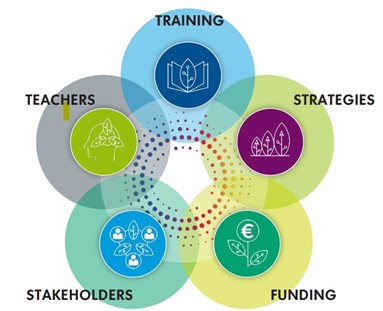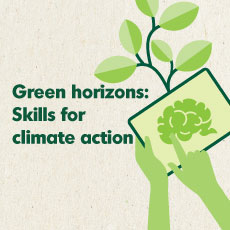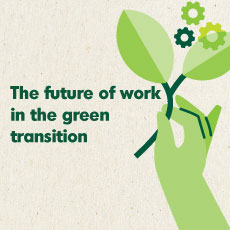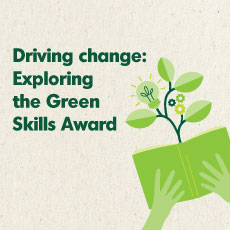
Greening the future: Using vocational excellence for a just transition
Susanne M. Nielsen, ETF
This article delves deeper into the specifics of how excellence in vocational education and training (VET) can be leveraged to ensure that the green transition is equitable. Drawing heavily on the experience of the ETF’s global green VET partnership GRETA (Greening Responses to Excellence through Thematic Actions), it discusses innovation and strategic partnerships that have proven effective in various regions. It highlights the transformative potential of grassroots initiatives when scaled through policy support and supported by educational frameworks. The highlighted stories, from around the world, show that the challenges and solutions are remarkably universal.
- ✅ 1. Introduction
The green transition aims at reducing carbon emissions, enhancing energy efficiency and boosting renewable energy use. It is vital for halting climate change through net-zero emissions. It affects industries and jobs because it requires fundamental skill adjustments.
It is critical that the green transition is also a just transition: supporting workers, employers, and communities as they shift towards sustainable economies. The Paris Agreement and Sustainable Development Goals stipulate this.
Shifting towards sustainability requires both global cooperation and local action. The call for global cooperation has never been more pressing. It is driven by the urgent need to tackle the triple planetary crisis of climate change, pollution and biodiversity loss. Nations made strong commitments in the now ten-year-old Paris Agreement. The UN Environment Programme's Emissions Gap Report from November 2023, however, paints a stark picture: the world is not making progress (UN Environment Programme, November 2023).COP28 marked the beginning of the end for the fossil fuel era. The Global Stocktake urges countries to update their nationally determined contributions (climate action plans) by 2025 in an all-out effort to keep temperature rises below 1.5°C from pre-industrial levels. Countries must triple renewable energy capacity and double energy efficiency by 2030. They must also phase out coal power and fossil fuel subsidies. This presents a crucial opportunity to elevate ambitions and speed up efforts to achieve the goals of the Paris Agreement.
But global cooperation and commitments must be matched with local action. The move towards full sustainability takes place locally. Indeed, roughly 70% of climate change mitigation efforts are driven by local authorities (UNEP, 2024). These governing bodies possess the power to implement policies and programmes that effectively alleviate the impacts of climate change.
Significant transformations are already reshaping lives. They affect jobs, skills, career paths and overall satisfaction with life (EBRD, November 2023). The World Economic Forum labels the shift towards sustainability and environmental consciousness as the next labour revolution and speaks of the rise of green-collar jobs. It estimates that by 2027, 60% of the global workforce will require reskilling and upskilling to meet the demands of the green economy (WEF, 2024). A recent global analysis by ManpowerGroup reveals that 75% of employers struggle to find suitable candidates with the necessary skills for environment, social, and governance goals, while 94% of candidates lack these skills (Manpower, 2024).
This illustrates how much education and training systems also need to adapt to the demands of the green transition. Transforming occupations to become more sustainable requires integrating technical skills for adapting and implementing green processes and technology, along with transversal skills that foster a holistic approach to thinking and acting green.
Most current VET systems cannot change at the required speed. They tend to change slowly because their autonomy is typically limited. The problems this has caused in recent years are set to grow exponentially as the green transition storms ahead without pause, calling for agile, innovative, bottom-up skills strategies.
Society and economy are changing and meeting their rapidly changing needs requires flexible, local skills eco-systems. This is where centres of vocational excellence (CoVEs) can play a significant role. Their force is the effectiveness with which they can respond to shifts in the labour market, address and fill skill gaps, and inspire the entire world of vocational training around them.
This article explores the role of such centres of vocational excellence in the process of the greening education and training. It offers insights drawn from analyses and reviews conducted by the European Training Foundation (ETF) and its Network for Excellence (ENE) through the global green VET partnership: GRETA – Greening Responses to Excellence Through Thematic Actions.
- Section 2 looks at the essence of vocational excellence and core concepts of centres of vocational excellence.
- Section 3 introduces GRETA with its innovative peer learning approaches and its system-wide approach to greening VET.
- Section 4 presents the ETF's insights on greening VET, derived from analyses, peer reviews and collaboration with centres of vocational excellence.
- Section 5 provides policy recommendations to further excel in greening VET.
- The annex provides links to greening practice from GRETA's thematic peer learning sessions.
- ? 2. What is vocational excellence and the core of CoVEs
Vocational education and training (VET) plays a key role in equipping individuals with the skills necessary for the green transition – the shift towards a more sustainable, inclusive and indeed innovative economy. This transition requires a workforce proficient in green skills that meet the growing demands of industries aiming to reduce carbon emissions and improve energy efficiency, in line with the Paris Agreement and the UN Sustainable Development Goals (SDGs).
The concept of vocational excellence takes this a step further. It aims to empower individuals with adaptable skills for lifelong learning. It emphasises the alignment of skills training with the needs of an innovative, inclusive, and sustainable economy. It promotes a learner-centred model for VET, which stresses integration into skills ecosystems that support local change in response to global climate policies.
CoVEs are at the forefront of this education evolution, distinguishing themselves from other vocational institutions in ways that are not uniform. CoVEs tend to specialise in specific vocational areas like renewable energy or construction, allowing for a deeper focus and a higher quality of training tailored to industry needs.
They prioritise close collaboration with industry partners and other stakeholders, fostering innovation in training programmes. Lifelong learning is a significant emphasis that is often manifested in programmes for adult upskilling and reskilling. Furthermore, CoVEs maintain an international outlook, seeking global partnerships to stay abreast of the latest industry trends and advancements.
In the construction sector, CoVEs lead the adoption of sustainable building practices. For instance, we see examples of CoVEs collaborating with local construction firms to implement innovative building methods, such as green materials and energy-efficient designs, resulting in significant reductions in carbon emissions and enhanced energy efficiency (ETF, 2023a and ETF, 2023b).
Similarly, in renewable energy, we see CoVEs play a critical role in developing and disseminating specialised training programmes, such as hands-on training modules for wind turbine technicians.
CoVEs drive interdisciplinary initiatives by collaborating extensively with stakeholders from various sectors. For instance, public private partnerships (PPPs) between CoVEs and technology companies and agricultural organisations lead to precision farming programmes that introduce advanced digital technologies into agricultural practice, enhancing efficiency and sustainability in modern farming.
The integration into CoVE curricula of problem-based learning through applied research and real-life case studies provides learners with practical experiences that are directly relevant to their future careers. We see many examples of CoVEs collaborating with local businesses to engage students in solving real-world challenges, such as designing energy-efficient building systems or optimising renewable energy installations.
Nominations of CoVEs can come from different institutions, including ministries, educational institutions, industry associations and local authorities. The nomination process varies across countries, mirroring variations in governance structures, education systems and policy agendas. The development of CoVEs from regular VET centres into the beacons of vocational excellence they become is a gradual process of growth and adaptation. To illustrate this progression, the ETF has devised a model with three distinct stages.
Initially, vocational schools or training centres typically enhance their standard VET activities while developing strong links with the local job market, ensuring that curricula and programmes align with employer needs. They then advance to strategic development, actively engaging in skills forecasting to keep pace with job market changes. At the peak of their development, CoVEs contribute significantly to local skills networks, fostering innovation and supporting regional growth. Their development into centres of vocational excellence is characterised by active contribution to the local and regional economy.
CoVEs play a special role in the green transition due to their unique characteristics. Their degree of specialisation allows them to produce graduates that are better able to support industries in the transition to greener practices. Their close industry collaborations lead to innovative training programmes that are directly responsive to the evolving demands of the green economy. The emphasis on lifelong learning and social inclusion ensures that the workforce remains adaptable and capable of ongoing professional development in response to new environmental challenges and technologies.
The international partnerships of CoVEs enrich the learning experience considerably. They expose students and staff to global best practice and innovation in green skills. This global perspective is crucial for preparing a workforce that can navigate local specifics of the green transition in an, often complex, international framework.
In essence, CoVEs are more than education institutions. They are catalysts for change, driving the development of a skilled, adaptable, and future-proof workforce essential for achieving sustainability goals. Their focus on vocational excellence, in alignment with the imperatives of a sustainable and inclusive economy, makes them indispensable partners in the journey towards a just and green transition. Through education, collaboration and innovation, CoVEs offer practical solutions to the pressing climate change challenges, thus playing an instrumental role in fostering economic development, enhancing community resilience, and building social cohesion. And, crucially, they can inspire and lift up other vocational schools and training institutions in their environment.
- ? 3. GRETA – a global greening VET partnership
One of the hallmarks of the European Training Foundation is vocational excellence development through partnership, peer learning and the exchange of practice. It shares access to a vast global knowledge base on vocational excellence through its ETF Network for Excellence (ENE).
Established in 2020, following the European Commission's endorsement of CoVEs as key agents in transforming vocational training, the ENE network supports its members in achieving and maintaining excellence in skills development. With over 300 members from more than 40 countries, including the EU, its neighbouring regions, Sub-Saharan Africa, and Asia, the network has quickly developed its reputation as a leading platform for collaboration on excellence in vocational training.
Within the ENE framework, the GRETA initiative – Greening Responses to Excellence through Thematic Actions – supports CoVEs in responding to the demands and opportunities of the green transition. The importance of international cooperation in developing green skills is underscored by the global nature of environmental challenges. The experience gained from GRETA's activities demonstrates a shared interest among CoVEs in embracing sustainable practice. This highlights the effectiveness of peer learning in accelerating the adoption of new ideas and practice.
The methodological framework of ENE and GRETA is designed to advance the greening of VET innovatively. This framework comprises four main components:
? Self-assessment enables CoVEs to evaluate their progress and pinpoint areas for improvement.
The ETF has developed a comprehensive self-assessment tool for use in the ENE network: ENESAT (ETF, 2021a).? Peer-to-peer reviews foster a culture of mutual learning and continuous development.
? Peer visits facilitate direct engagement and sharing of good practice and experiences among ENE members.
? Thematic peer learning sessions allow for focused discussions and sharing of practice on specific greening topics.
GRETA’s system-wide approach to integrating environmental sustainability into VET encompasses five interconnected dimensions whose primary aim is to ensure that sustainability goes beyond being just a curricular subject and instead becomes a core principle of VET policies, practices, and culture.
These five dimensions are:
- Developing clear, systematic greening strategies that align with horizontal policies, vertical governmental interconnections, and institutional priorities.
- Engaging a broad range of stakeholders, including government officials, education institutions, and the business sector, to support the green transition in VET.
- Revamping curricula and training programmes to include sustainability goals, equipping learners with necessary green skills and promoting a sustainable shift in values and mindsets.
- Ensuring teachers receive professional development to deliver high-quality green education effectively.
- Securing dedicated resources and establishing funding frameworks to advance VET greening initiatives.

This comprehensive, system-wide approach to greening VET vastly improves the development of skills needed for the green transition while making sure that this transition is just and fair and extends across all aspects of vocational training. GRETA expands the UNESCO-UNEVOC guidelines for greening VET (UNESCO-UNEVOC, 2017), by developing a systematic approach that resonates with the characteristics of vocational excellence and CoVEs. This emphasises the strong collaboration between VET stakeholders within skills ecosystems.It aims to navigate towards a more sustainable economy while ensuring fairness and equity throughout society, thereby preventing anyone from being left behind in the transition. This entails safeguarding workers' rights, providing support to affected communities, and addressing social disparities. Expanding the scope of skills ecosystems to encompass social ecosystems acknowledges the connection between technical and social aspects of skill development. This comprehensive approach is critical for advancing the goals of a just transition, ensuring that skill development initiatives are equitable and sustainable (Ramsarup et al, 2023).
By implementing these methodologies and approaches, the ETF, through its ENE network and the GRETA initiative, is setting a new standard for vocational excellence in the era of the green transition, ensuring that VET systems not only adapt to but also actively shape a sustainable future.
- ? 4. Greening VET – what we have learned so far
This section shares insights gained from analysis, peer reviews and direct collaboration with CoVEs. It explores the five interconnected dimensions of the system-wide approach introduced in the previous section.
The ETF report Greening VET – Processes, practices and policies (ETF, 2023a) provides detailed practice and experiences from countries such as Armenia, Denmark, Finland, Georgia, Latvia, Morocco, Serbia, Slovenia, Türkiye and Ukraine.
- ? 5. Policy pointers
CoVEs, with their emphasis on collaboration and partnership in VET, can play a key role in driving the green transition forward. Recognising the importance of engaging with businesses and the private sector, particularly in understanding the skills required for green jobs, the ETF emphasises the necessity of fostering green skills ecosystems. This entails creating tailored training programmes that address specific needs, providing students with practical experiences, and ensuring access to cutting-edge technology.
Unlocking the full potential of CoVEs relies on robust support from policymakers and stakeholders alike. This support is essential for empowering CoVEs to lead meaningful reforms in VET, steer regional skills development towards sustainability, and shape policymaking initiatives that align with the skills needs of the future economy.
Based on ETFs analyses, peer reviews, and peer exchanges in GRETA, ETF has formulated policy recommendations. These aim to bridge the skills gap, promote green skills development, and contribute to sustainable development and economic prosperity.
- ? References
Cedefop (2022), Teachers and trainers in a changing world: Building up competences for inclusive , green and digitalised VET, Luxembourg: Publications Office of the European Union.
European Bank for Reconstruction and Development, November (2023), EBRD transition report 2023 – 2024, EBRD.
ETF (2020), Centres of vocational excellence: An engine for vocational education and training development, European Training Foundation, Torino.
ETF (2021a), ENE working paper exploring vocational excellence, European Training Foundation, Torino.
ETF (2021b),Centres of vocational excellence - Autonomy in forging public-private partnerships in vocational education and skills development, European Training Foundation, Torino.
ETF (2023a), Greening Vocational Education and Training – Processes, Practices and Policies, available at: GRETA – Greening of vocational education and training: Processes, practices and policies | ETF (europa.eu), European Training Foundation, Torino.
ETF (2023b), Building evidence to support vocational excellence for the digital and green transitions The Role of Centres of Vocational Excellence in the Green Transition, available at: CoVEs in the green transition.pdf (europa.eu),European Training Foundation, Torino.
European Trade Union Committee for Education (2021), Environmental sustainability – education and training, ETUCE, Brussels.
GIZ (2022), Skills for a just transition to a green future, GIZ, Bonn.
International Energy Agency (2021), The importance of focusing on jobs and fairness in clean energy transitions, IEA, Paris.
International Energy Agency (2024), Massive expansion of renewable power opens door to achieving global tripling goal set at COP 28, IEA, Paris.
International Labour Organisation (2020), Effective governance and coordination in skills systems: towards a lifelong learning ecosystem, ILO, Geneva.
International Labour Organisation (2023), Achieving a just transition towards environmentally sustainable economies and societies for all, ILC 111 Session, 2023, ILO, Geneva.
ManpowerGroup (2024), Global Talent Shortage, ManpowerGroup, Milwaukee.
Rieckmann, M., Mindt, L. & Gardiner, S. (2017). Education for sustainable development goals: learning objectives, UNESCO, Paris.
Ramsarup et al (2023), Reframing skills ecosystems for sustainable and just futures, International Journal of Education Development, Volume 101, September 2023, 102836, Elsevier, Amsterdam.
SDG Knowledge Hub (2023), COP 28 heralds ‘beginning of the end’ of fossil fuels, IISD, Winnipeg.
UNESCO (2021), Getting every school climate-ready - How countries are integrating climate change issues in education, UNESCO, Paris.
UNESCO-UNEVOC (2017), Greening Technical and Vocational Education and Training, UNESCO, Paris.
UNESCO-UNEVOC (2021), Skills development and climate change action plans - Enhancing TVET's contribution, UNESCO, Paris.
UNICEF, 2023, Accelerating ‘green’ school-to-work transitions, UNICEF, New York.
United National Environment Programme (2023), Emissions gap report, UNEP, Nairobi.
World Economic Forum (2023), The future of jobs report 2023, WEF, Cologny.
World Economic Forum (2024), The rise of green-collar jobs – and 6 other predictions for 2024’s labour market, WEF, Cologny.
- ? Annex: An overview of GRETA’s thematic peer learning sessions
The following is an overview of GRETA's thematic peer learning sessions with links to the relevant materials.
Other articles
Experts from outside the ETF have contributed to this collection of ETF articles with first-hand experience from their own very colourful patchwork of work environments. See also below.



